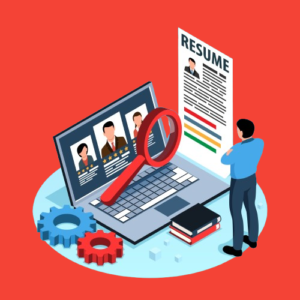In today’s competitive job market, “the importance of personal branding” cannot be overstated. Employers no longer rely solely on CVs and cover letters to assess candidates. They also look at online profiles, social media activity, and how individuals present themselves professionally. A strong personal brand helps you stand out, communicate your value, and establish credibility in your industry.
Whether you’re a fresh graduate or an experienced professional, creating and maintaining a compelling personal brand can significantly impact your career growth and opportunities. Let’s explore what personal branding is, why it matters, and how to build one that gets noticed.
Click here to discover how personal branding can set you apart and accelerate your career success!
What Is Personal Branding?
Personal branding is the process of defining and promoting your unique professional identity. It’s about showcasing your skills, values, and expertise to create a memorable and consistent impression.
Your personal brand combines several elements, including:
Your online presence: Social media profiles, LinkedIn activity, and portfolio websites.
Your communication style: The way you interact, write, and speak.
Your expertise: Skills, accomplishments, and professional achievements.
By building a strong personal brand, you control the narrative of how others perceive you professionally.
Why Is Personal Branding Important in Today’s Job Market?
The job market has evolved, and personal branding plays a vital role in career success for several reasons:
1. It Sets You Apart from Competitors
In a sea of applicants with similar qualifications, your personal brand makes you unique. It highlights what you bring to the table that others don’t.
Example:
If you’re a graphic designer, showcasing a personal brand with creative and innovative projects can make you stand out.
2. It Establishes Credibility
A strong personal brand shows that you are knowledgeable and trustworthy in your field. Employers and recruiters are more likely to approach candidates with a credible and consistent professional image.
3. It Attracts Opportunities
When you actively manage your personal brand, you increase your visibility. This can lead to new job offers, partnerships, or freelance projects.
4. It Shows Adaptability to the Digital World
Employers value professionals who understand the importance of online presence. A well-crafted personal brand reflects your ability to adapt to modern workplace trends.
Read more: Personal Branding Strategies for Job Seekers and Entrepreneurs
Key Elements of a Strong Personal Brand
1. Define Your Unique Value Proposition (UVP)
Your UVP is what makes you different and valuable in your field. Identify your key skills, strengths, and what you offer that others cannot.
Example:
If you’re a software developer, your UVP could be your expertise in artificial intelligence combined with a knack for problem-solving.
2. Maintain a Professional Online Presence
Your digital footprint plays a huge role in personal branding. Ensure your LinkedIn, Twitter, and other professional profiles are up-to-date and aligned with your career goals.
– Use a professional photo.
– Write an engaging LinkedIn summary.
– Regularly share industry-related insights or content.
3. Showcase Your Expertise
Highlight your skills and achievements through blogs, portfolios, or speaking engagements. Sharing your knowledge positions you as an authority in your field.
4. Consistency Across Platforms
Consistency builds trust. Use the same tone, visuals, and messaging across all platforms to strengthen your brand identity.
Read more: Why Does a Good CV Matter for Jobs?
How to Build Your Personal Brand
1. Start with Self-Reflection
Ask yourself:
– What are my career goals?
– What do I want people to associate with my name?
– What skills and values define me as a professional?
This clarity helps you craft a brand that aligns with your ambitions.
2. Optimise Your LinkedIn Profile
LinkedIn is a key tool for personal branding. Use it to showcase your experience, skills, and accomplishments.
– Write a compelling headline.
– Add quantifiable achievements to your experience section.
– Ask for recommendations to build credibility.
3. Create a Portfolio or Personal Website
A personal website serves as a central hub for your brand. Include:
– Your CV.
– Examples of your work.
– Contact information.
4. Leverage Social Media
Share content related to your industry on platforms like Twitter or Instagram. Engage with others by commenting on posts, joining discussions, and following thought leaders.
5. Network Strategically
Attend industry events, webinars, or workshops. Building connections helps spread awareness about your personal brand.
Common Mistakes to Avoid in Personal Branding
While building your personal brand, steer clear of these pitfalls:
1. Inconsistency
Different messaging across platforms can confuse your audience. Stay consistent with your tone and visuals.
2. Overemphasis on Personal Life
Mixing too much personal content with professional branding can dilute your message. Keep personal updates to a minimum.
3. Ignoring Feedback
Pay attention to how others perceive your brand and be willing to adapt.
Read more: 5 Steps to Build a Strong Personal Branding to Land a Job
How Personal Branding Boosts Job Opportunities?
Employers value candidates with strong personal brands because they demonstrate initiative, confidence, and expertise. Here’s how personal branding can lead to job success:
1. Increases Visibility to Recruiters:
Recruiters actively search for candidates online. A strong personal brand ensures you appear in these searches.
2. Builds a Positive Reputation
A well-maintained brand shows you are serious about your career and committed to growth.
3. Strengthens Your Networking
A recognisable personal brand attracts meaningful connections and opportunities in your field.
Real-Life Examples of Personal Branding Success:
LinkedIn Influencers: Many professionals have used LinkedIn to build their brands and gain followers, leading to job offers or consulting opportunities.
Freelancers: Designers, writers, and developers use personal branding to attract high-paying clients.
Read more: How to Create a Personal Brand for Success?
Conclusion:
“The importance of personal branding” in today’s job market cannot be ignored. It’s no longer enough to have a polished CV. Employers and recruiters want to see a cohesive and professional online presence that reflects your skills and values.
By defining your unique value proposition, maintaining a consistent online presence, and actively networking, you can build a personal brand that opens doors to exciting career opportunities.
Start building your personal brand today and take control of your professional future.
Get your LinkedIn Profile Optimised alongside an entire range of Personal Branding: www.brandme4job.com
Join www.stunited.org to build a wide network in the United Kingdom.
Contact us to get Career Assistance in the UK: Call Us Now!
#Brandme4job #Brandme4job.com #PersonalBranding #JobSkillsTraining #E-BookStore #OnlineBooks #SkillDevelopment #UKJobMarket #CareerBranding #CareerInTheUK #JobsInTheUK #CareerOpportunities #JobAssistance #DesignerCV #ATSEnabledCV #AICV #ProfileOptimisation #StunitedProfileOptimisation #CoverLetter #CandidateBooklet #EPortfolio #MagazineFeature #LinkedInOptimisation





